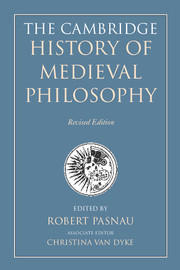Book contents
- Frontmatter
- Contents of Volume 1
- Preface
- List of contributors
- Frontmatter
- Contents of Volume 2
- Introduction
- I Fundamentals
- II Logic and language
- III Natural philosophy
- IV Soul and knowledge
- 21 Soul and body
- 22 The soul’s faculties
- 23 The nature of intellect
- 24 Perception
- 25 Mental representation
- 26 Science and certainty
- 27 Divine illumination
- 28 Skepticism
- V Will and desire
- VI Ethics
- VII Political philosophy
- VIII Metaphysics
- IX Theology
- Appendices
- Bibliography of primary sources
- Bibliography of secondary sources
- Index nominum
- Index rerum
- References
23 - The nature of intellect
from IV - Soul and knowledge
Published online by Cambridge University Press: 05 August 2014
- Frontmatter
- Contents of Volume 1
- Preface
- List of contributors
- Frontmatter
- Contents of Volume 2
- Introduction
- I Fundamentals
- II Logic and language
- III Natural philosophy
- IV Soul and knowledge
- 21 Soul and body
- 22 The soul’s faculties
- 23 The nature of intellect
- 24 Perception
- 25 Mental representation
- 26 Science and certainty
- 27 Divine illumination
- 28 Skepticism
- V Will and desire
- VI Ethics
- VII Political philosophy
- VIII Metaphysics
- IX Theology
- Appendices
- Bibliography of primary sources
- Bibliography of secondary sources
- Index nominum
- Index rerum
- References
Summary
The views of medieval philosophers on the nature of the intellect were framed around the interpretation of Book III of Aristotle’s De anima, especially Chapters 4 and 5, in which Aristotle investigates the nature of the power he calls nous – “mind” or “intellect.” Medieval philosophers were also influenced by Neoplatonic sources such as Plotinus, Proclus, and Porphyry, as well as by the late Greek commentators on Aristotle’s De anima, many of whom read Aristotle’s theories through a Neoplatonic lens.
Aristotle’s method for determining the nature of the intellect and other psychological faculties is to analyze the operations for which the faculty is responsible. Thus Aristotle begins his examination of the nature of intellect in De anima III.4 by noting that, like sense perception, the intellect’s proper operation of thinking is a kind of process that involves a change or alteration on the part of the knower. Aristotle argues that the intellect must therefore be divisible in some way into two parts or aspects – one that is passive and receptive of the change, and another that is active, inasmuch as it produces the change in the patient. Among medieval authors, the former intellect came to be known as the “potential,” “possible,” or “material” intellect, and the latter as the “agent” intellect. Further developing this account of intellection as a process, Aristotle argues that before actually thinking, the intellect is potentially like its object; in the act of thought it is altered in a non-physical way, so as to become actually identified with that object. Thought, then, involves the cognitive assimilation or identification of the knower with the object known – a characteristic that on Aristotle’s view thinking shares with sense perception.
- Type
- Chapter
- Information
- The Cambridge History of Medieval Philosophy , pp. 320 - 333Publisher: Cambridge University PressPrint publication year: 2014
References
- 1
- Cited by

